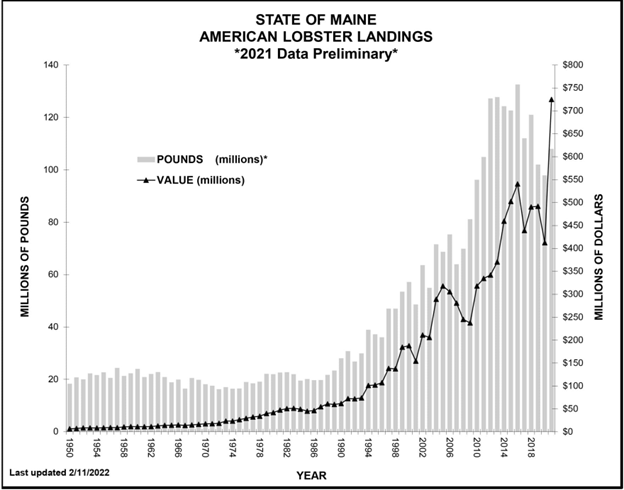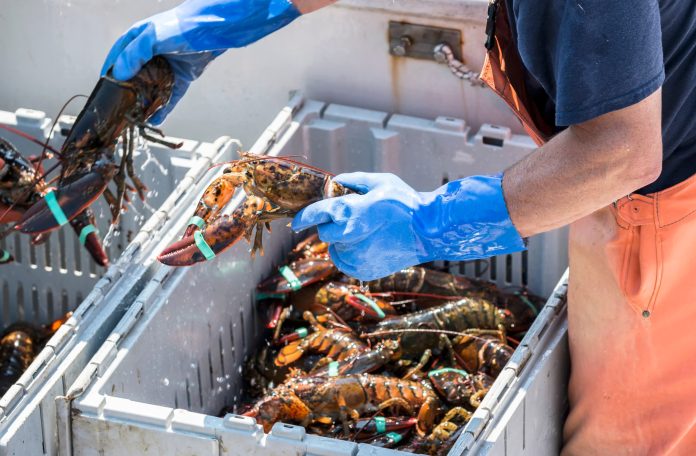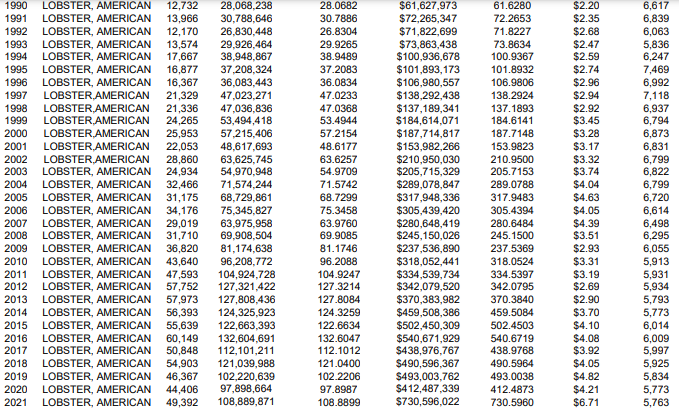By Anthony Watts and H. Sterling Burnett
An August 25th article in the New York Times (NYT), titled “What the Lobstermen of Maine Tell Us About the Election” claims “…as far as climate change goes, Maine’s lobster fishing community may well be America’s own canary in the coal mine,” implying that harm to Maine’s lobster fishing industry is an early indicator of the dangers from climate change. This is false. Multiple lines of data show that the Maine lobster industry is doing well. Amid a mild warming over the past century, record lobster hauls have been recorded in the last 10 years even as the number of licensed lobstermen has fallen significantly.
Climate Realism discussed the fortunes of the lobster fishery in the face of climate change previously in an October 2020 Climate Realism story.
“The Maine Department of Marine Resouces (DMR) reports that each of the 10 highest annual lobster catches occurred during the past 10 years,” reported the 2020 Climate Realism post. “Lobster catches in Maine are presently double what they were just 20 years ago.”
With two additional years of data, the story is still the same, recent years catches remain among the highest ever recorded.
In fact, DMR data show that amid historically normal year to year variations in catch totals, over the past 34 year period of modest warming, Maine’s lobster catch has increased by approximately 288 percent since 1990, even as the number of licensed lobster fishers declined by almost 13 percent, largely due to stricter regulations raising the cost to operators. (See the table, below)
The NYT says in their article, “In part because of climate change, Ms. Guenther believes, the number of full-time lobster fishermen in Maine may decline by as much as one-half during the next decade.” If so that will likely be because of federal regulations limiting lobster operations ostensibly to protect endangered North Atlantic right whales even as the government promotes massive offshore wind complexes in lobster and whale habitat. Climate rules, not modestly warmer waters, are the biggest threat to the lobster industry.
A 2023 masonslobster.com article discussing the state of the industry, also directly refutes the NYT’s analysis:
Last year, Maine fishermen hauled ashore 124 million pounds of lobsters, six times more than what they’d caught in 1984. The $456 million in value those landings totaled was nearly 20% higher than any other year in history, in real terms. These days, around 85% of American lobster caught in the US is landed in Maine—more than ever before.
Even more remarkable than sheer volume, though, is that this sudden sixfold surge has no clear explanation. A rise in sea temperatures, which has sped up lobster growth and opened up new coastal habitats for baby lobsters, is one likely reason.
The National Oceanic and Atmospheric Administration (NOAA) has this to say about the state of Maine’s lobster fishery:
Maine’s economy has reaped the benefits of the lobsters’ move. In 2014, New England’s lobster industry was worth $564 million. Maine alone reported $459.6 million—81% of the total. The arrival of the lobster seems like a boon for Mainers, but the thing that pushed them north hasn’t gone away: warming ocean temperatures.
Clearly, warmer ocean temperatures, a common claim from climate change advocates, have, if anything, had the effect of increasing lobster hauls in Maine, rather than causing a significant decline. (see the graphic, below)
In 2021, the value of the Maine lobster catch skyrocketed:

NewsCenter Maine recently cited DMR preliminary data for 2023 which suggests that the lobster haul fell in 2023 to 93,734,116 pounds of lobster, but that figure is in line with the historical interannual changes in the haul. It is still higher than every year prior 2010, even with a decline in licensed lobster fishers.
Despite the lower catch, the value of the lobster haul increased by $72 million from 2022 to 2023, reaching $461,371,720. This was due to a significant increase in the price paid to fishermen, from $3.97 per pound in 2022 to $4.95 per pound in 2023.
Rather than climate change, in fact, the NYT reports that invasive species are a likely reason for recent declines:
To begin, sea squirts are suddenly everywhere. Translucent, water-filled organisms known as tunicates and about the size of a golf ball, they can spread rapidly across the ocean floor, fouling oyster beds and leeching oxygen from the seawater. “After they die off,” Mr. Black said, “the bottom is dead.” Sea squirts were most likely imported in the bilge water of a foreign ship, and they can now thrive in the Gulf of Maine, whose water has warmed.
Sea squirts, brought in by a ship in bilgewater, have nothing to do with climate change.
Also, since climate change operates on long time scales, of 30 years or more, claims by the NYT of a climate connection to reducing catches in any single year are simply rank speculation with nothing to back it up. That’s probably why the NYT article was in the opinion section of the newspaper.
Contrary to the impression given by the NYT promoting the prescribed climate crisis narrative that climate change causes nearly every bad thing that happens, data show that Maine’s lobster fishery is doing well. It is profitable and the catch remains abundant. NYT’s story is shoddy journalism at best.




















